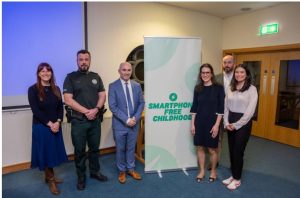On Thursday 6th February, Alex Easton MP and PSNI District Commander
Superintendent Johnston McDowell co-hosted an evening for North Down
Headteachers and Chairs of Boards of Governors on the topic of smartphone and
social media use for children and young people.
Presenters included Detective Superintendent Jordan Piper (Public Protection
Branch), Jonathan Bell (Senior Social Worker), Dr. Peter Cosgrove (Consultant
Paediatric Emergency Medicine and Honorary Lecturer, QUB) along with local
parents Katie Strawbridge and Rosalind McClean from Smartphone Free Childhood.
Speakers outlined the growing evidence of the harms of smartphone and social
media use for young people with professionals from the PSNI, Emergency Medicine
and Social Work outlining the day-to-day outworkings in their fields.
Ofcom data shows 24% of 5-7 years olds in the UK have their own smartphones and
this rises to 89% by age 12. Whilst polling data from Parentkind indicates 94% of
parents of primary school children believe smartphones are harmful, almost all
children have a smartphone by the time they leave primary school. Smartphone
Free Childhood says that parents feel they’ve been put in an impossible position –
they either give their child a smartphone or risk alienating their child from their peers
at a crucial stage of their development. The group therefore encourages parents to
come together to form voluntary pacts to delay giving smartphones to children until
at least age 14, with no social media access until age 16. To date parents at over
200 schools in Northern Ireland, many of whom are in North Down, have signed the
pact.
The parent pact is a tried and tested model with 8 headteachers in Greystones, Co.
Wicklow successfully encouraging parents to make a voluntary code in 2023. The
town is now dubbed ‘Ireland’s phone-free town’ and featured in a recent BBC World
Service documentary.
Rosalind McClean, Smartphone Free Childhood Regional Co-Leader for Northern
Ireland writes “We understand smartphone and social media use for our children and
young people is a huge issue for our society. Whilst we as parents are coming
together to try to collectively delay the age at which we give our children
smartphones, we cannot do this alone. We are keen to work with all our policy
makers in any of our political parties. More government regulation is required but in
the meantime parents and schools need to work together and we’re grateful to our
Smartphone Free Childhood is a restricted fund under the auspices of Prism the Gift Fund Charity Number 1099682
MP and the PSNI for facilitating this opportunity. Our hope is that all schools will
implement fully smartphone-free schools, bell-to-bell. For the growing number of
parents opting to delay giving their child a smartphone, it is critical that children are
not being asked to use a phone for educational purposes in the classroom.”
How to Join Us
To find out more about Smartphone Free Childhood, parents can go to
www.smartphonefreechildhood.co.uk. From there, you can sign the Parent Pact and
find and join the Northern Ireland WhatsApp Community and join a group within your
local area.
You can also stay updated on upcoming events by visiting Smartphone Free
Childhood – Northern Ireland Facebook page.
About Smartphone Free Childhood:
Smartphone Free Childhood launched spontaneously in Feb 2024 after a WhatsApp group
started by two mums called Parents United for a Smartphone Free Childhood went viral.
Within hours the WhatsApp group was full, and within weeks there was a local Smartphone
Free Childhood WhatsApp group in every county across the UK – many of which had
hundreds of school groups within them.
There are now over 200,000 parents in the Smartphone Free Childhood community, many of
whom are actively working to make change in their communities by making pacts with other
parents to delay giving their children smartphones, and working collaboratively with schools
to go smartphone-free.
Inspired by the movement, in April, 20 out of 24 primary schools across the city of St Albans
announced that they were going smartphone-free, and in May, 18 out of 20 state
secondaries in the London borough of Southwark. Many others have since followed suit.
Smartphone Free Childhood groups have also sprung up in countries across the world, from
Brazil to the Netherlands, from the USA to the UAE making it clear that this is a global issue
that parents across the world are struggling with.
Smartphone Free Childhood is now setting up as an official charity, growing its army of
active parents and using a collective voice to challenge Big Tech’s colonisation of childhood.
Because childhood is too short to be spent on a smartphone.
